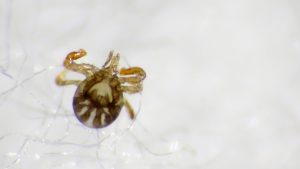Per the US Centers for Disease Control, Lyme disease is caused by the bacterium Borrelia burgdorferi, and is transmitted to humans via the bite of a tick infected with this bacteria. The Lyme disease bacteria has not been cultured from human milk (though associated DNA have been detected – see below), and no babies have developed Lyme disease from their mothers’ milk.
Here is what we know:
- In a paper from the US Centers for Disease Control website (Cooper & Feder, 2004), it is stated that: “B. burgdorferi has never been cultured from human breast milk, and there is no case of an infant developing symptomatic or asymptomatic B. burgdorferi infection from breast milk.”
- In one study (Ziska et al, 1996), seven breastfeeding mothers with Lyme disease were studied, and none of their babies contracted Lyme disease.
- In another study (Schmidt et al, 1995), DNA associated with Lyme disease were detected in the breastmilk of two mothers, but neither of their babies contracted Lyme disease – per Lawrence & Lawrence (2016), it is not known whether the DNA were from infectious spirochetes or were non-infectious DNA fragments.
If a mother does become infected with Lyme disease, she will likely not know about it until symptoms appear (7-14 days or longer), and baby will have already been exposed to the illness at that point (IF it can be transmitted via breastmilk – we don’t know whether this is possible). Breastfeeding builds baby’s immune system and will also provide baby with extra antibodies to Lyme disease. Discontinuing breastfeeding would deprive baby of the extra immune protection from breastfeeding.
Now infants can get
all their vitamin D
from their mothers’ milk;
no drops needed with
our sponsor's
TheraNatal Lactation Complete
by THERALOGIX. Use PRC code “KELLY” for a special discount!

John Tann flickr cc
The general consensus is that breastfeeding should continue if a mother has Lyme disease, if she has already started or completed treatment. There are several medications that can be used to treat Lyme disease in breastfeeding mothers.
Lawrence & Lawrence (in Breastfeeding: A Guide for the Medical Profession, 2016) suggest that since we don’t have concrete evidence on the possibility of transmission, this should be discussed with the mother and (depending on the mother’s wishes) breastfeeding could be withheld until the mother’s treatment has been started or completed. They recommend observing baby for symptoms of Lyme disease whether or not the mother discontinues breastfeeding temporarily, and treating baby if symptoms appear.
Hale (in Medications & Mothers’ Milk 2017) recommends stopping breastfeeding until treatment begins.
Additional Information & References
Lawrence R, Lawrence R. Breastfeeding: A Guide for the Medical Profession, 8th ed. Philadelphia, Pennsylvania: Mosby, 2016: 224, 462-463.
Cooper JD, Feder HM Jr. ![]() Inaccurate information about lyme disease on the internet. Pediatr Infect Dis J. 2004 Dec;23(12):1105-8.
Inaccurate information about lyme disease on the internet. Pediatr Infect Dis J. 2004 Dec;23(12):1105-8.
“The generally accepted (included in position statements by the Academy of Pediatrics, the College of Rheumatology and the Infectious Disease Society of America) and evidence-based information for these topics is as follows…. During or After Treatment of Lyme Disease, Is It Safe to Breast-feed? It is safe to breast-feed while being treated for Lyme disease. B. burgdorferi has never been cultured from human breast milk, and there is no case of an infant developing symptomatic or asymptomatic B. burgdorferi infection from breast milk.”
Hale TW, Rowe HE. Medications and Mothers Milk. 17th Edition. New York, New York: Springer Publishing Company; 2017: 582-3.
InfantRisk Center. Inaccurate Information Online Regarding Breastfeeding with Lyme Disease
Mohrbacher N. Breastfeeding Answers Made Simple. Amarillo, Texas: Hale Publishing, 2010: 733-734.
Committee on Infectious Diseases: Report of the Committee, Red Book, 25th ed. Elk Grove Village, Illinois: American Academy of Pediatrics 2000, p. 375.
Advisory Committee on Immunization Practices, US Centers for Disease Control. Recommendations for the Use of Lyme Disease Vaccine Recommendations of the Advisory Committee on Immunization Practices (ACIP). MMWR. 1999 June 04; 48(RR07);1-17.
Routes of Transmission: Humans acquire B. burgdorferi infection from infected ticks at the time the tick takes a blood meal; Lyme disease is not spread by person-to-person contact or by direct contact with infected animals. Transplacental transmission of B. burgdorferi has been reported, but the effects of such transmission on the fetus remain unclear. The results of two epidemiologic studies document that congenital Lyme disease must be rare, if it occurs at all. Transmission in breast milk has not been described. B. burgdorferi can be cultured from the blood in some patients with early acute infection, and it is able to survive for several weeks in stored blood. However, at least one study has found that the risk for transfusion-acquired infection is minimal.
Ziska MH, Giovanello T, Johnson MJ, Baly J. Disseminated Lyme disease and pregnancy. 9th Annual International Scientific Conference on Lyme Disease and Other Tick-Borne Disorders. Boston, MA, April 19-20, 1996.
Shapiro ED. Lyme disease in children. Am J Med. 1995 Apr 24;98(4A):69S-73S.
Schmidt BL, Aberer E, Stockenhuber C, Klade H, Breier F, Luger A. Detection of Borrelia burgdorferi DNA by polymerase chain reaction in the urine and breast milk of patients with Lyme borreliosis. Diagn Microbiol Infect Dis. 1995 Mar;21(3):121-8.
Stiernstedt G. Lyme borreliosis during pregnancy. Scand J Infect Dis Suppl. 1990;71:99-100.
